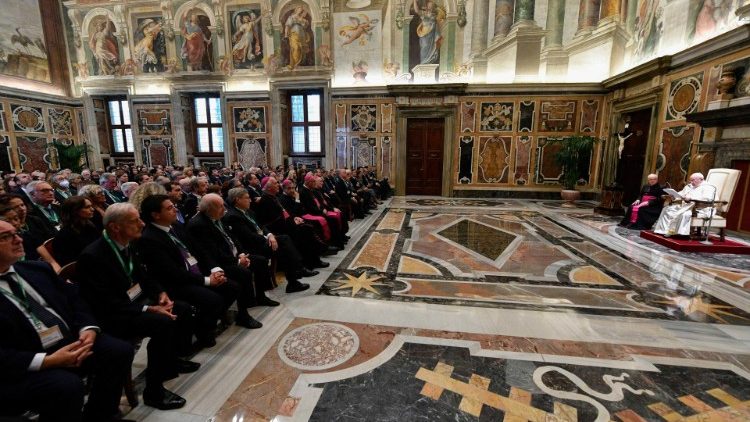Pope: Inclusive growth begins with a gaze that is not turned in on itself
Pope Francis highlights the importance of a new outlook for the future based on inclusive growth and sustainable development in his address to the Centesimus Annus Foundation.
Oct 10, 2022

By Benedict Mayaki, SJ
Pope Francis met with the participants in the meeting of the Centesimus Annus Pro Pontifice Foundation in the Vatican on Saturday morning.
In his address to them, he acknowledged all the work carried out by the Foundation, particularly regarding the Church’s social doctrine: first, at the level of reception - making it known and understood; then at the level of deepening, because they read the complex economic and social world from the inside, and can continually compare the doctrine with reality, which is always in motion and always changing.
Inclusive growth, sustainable development
The Pope then focused on the theme of the meeting: “Inclusive Growth to Eradicate Poverty and Promote Sustainable Development for Peace."
He said that the key expression “inclusive growth” brings to mind St. Paul VI’s Populorum progressio where he states that “development cannot be restricted to economic growth alone” but to be authentic, “must be well-rounded” and “foster the development of each man and of the whole man.”
Here, Pope Francis stressed that “development is either inclusive or it is not development” and highlighted that it is the task, particularly of the lay faithful, to make economic reality "leaven" in an ethical sense, and promote growth in the sense of development.
“And you try to do that, starting from the vision of the Gospel,” the Pope said. “For everything comes from how you look at reality.”
A gaze not turned in on itself
“Everything stems from how one looks and where you look,” affirmed Pope Francis, noting that Jesus’ gaze was able to see the gesture of total giving in the poor people who put two pennies in the offering box at the temple (Mk 12: 41 – 44).
He added that the only time it is permissible to look on another from above is in order to help him or her rise.
Illustrating his point, the Pope referred to the work of a contemporary American writer who talks about the time before the stock market crash. The author noted that within the various states, the depression was already being felt and farmers and labourers were in a state of alarm. However, amid the many desperate people he met on the streets, “Master Yehudi taught me never to look down on anyone.” (PAUL AUSTER, Mr Vertigo, Turin 2015, 126).
The Pope stressed that “Inclusive growth finds its starting point in a gaze that is not turned in on itself, free from the pursuit of profit maximization.” Echoing his own words in Laudato si’, he said that “helping the poor financially must always be a provisional solution in the face of pressing needs. The broader objective should always be to allow them a dignified life through work.”
The Holy Father further warned against a global throwaway culture that will be promoted if everyone fails to commit to pushing for work policies for the most fragile. He recalled the encyclical Fratelli tutti, where he noted that “wealth has increased, but together with inequality, with the result that new forms of poverty are emerging.”
Need for a new outlook
Pope Francis highlighted that the “future calls for a new outlook” where “each one in his or her own small way is called to be a promoter of this different way of looking at the world, starting with the people and situations he or she lives in daily life.”
He upheld the example of the Master in Paul Auster’s “Mr Vertigo,” who teaches his student never to look down on anyone as a “good indication for everyone.”
He said that with this foundation one can interpret the important reflections conducted during these days through “the conversion of each person’s gaze” – the humble gaze of one who sees in every man and woman he or she encounters a brother and sister to be respected in their dignity, before possibly seeing a customer with whom to do business.
The Holy Father concluded by thanking the participants of the Centesimus Annus Foundation for their commitment to promoting inclusive growth and knowledge of the Church’s social doctrine. Finally, with a request for prayers for himself, he blessed them all and their families.--Vatican News







Total Comments:0